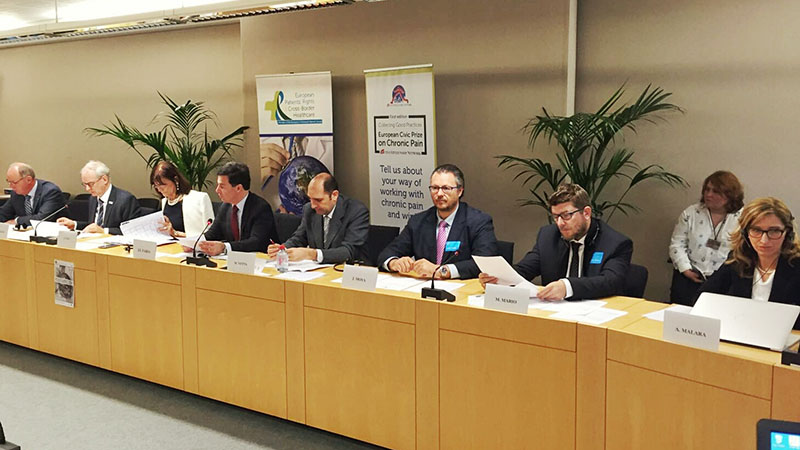
Article 8.5 of the Directive 2011/24/EU states that the degree of patient’s pain must be taken into account in the process of the cross-border healthcare treatment authorization.
Member States should have transposed the Directive into their national legislation by October 2013 and, consequently, should have put in place mechanisms to assess the patient's level of pain.Unfortunately, in the transposition process at national level only few Countries have formally recognized the importance of the assessment of the degree of patient's pain as stated in article 8.5, setting the benchmark on the implementation of the cross-border healthcare directive.
In practice, do the National implementation measures include a reference to the intensity of pain? Do the medical records have now specific sections dedicated to the patient's pain assessment? How common is pain measurement in the EU Member States? According to the intensity of pain, do patients receive any medical advice from their doctors about which foreign leading facility is more appropriate for them? Are the National Contact Point able to refer patients to specialized centers in their own country or abroad?
The conference aims to underline how the protection of patients' rights seeking care abroad is also related to an effective implementation of the Directive 2011/24/EU cross-border healthcare.
Indeed, the patient’s pain entity is a fundamental aspect to consider in order to assure him the whole respect of his rights.
This aspect could also help in building a European network of centers of excellence specialized in pain therapy, improving pain treatment and enhancing the quality of life of chronic pain patients.
Within the framework of the Societal Impact of Pain (SIP) a research was conducted in order to assess the level of implementation of the Directive 2011/24/EU on the application of patients’ rights in cross-border healthcare in respect of pain and detailed policy recommendations were set out as the result of collaboration between chronic pain patients, healthcare practitioners, researchers, scientists and other stakeholders involved in pain care. The outcomes of the SIP Symposium Working Group 1 will give additional food for thoughts on how the Member States can provide guidance, information and protection to citizens and patients following the correct implementation of Directive 2011/24/EU Article 8(5) in respect of pain.
The meeting will be an open debate on this topic, based on case histories, experiences, good practices and issues faced in the EU Member States.
It is organized by Active Citizenship Network in partnership with EFIC and it will be hosted by MEP Patrizia TOIA at the European Parliament in Brussels on June 21stfrom 10:00 to 12:00 in room PHS 1C047.
Interpretation available in EN & IT.
Programme and biographies
09:30 – 10:00 Registration & Accreditation
Meeting point: AltieroSpinelli (ASP) entrance in front ofAgora Simone Veil
Chair: Bart Morlion, EU-Liaison Officer and President Elect of European Pain Federation (EFIC)
10:00 – 10:20 Welcome address and keynote presentation
- MEP Patrizia Toia, S&D (Italy)
- MEP José Inácio Faria, ALDE (Portugal)
- Mariano Votta, Director of Active Citizenship Network
10:20 – 10:40Implementing article 8.5 of the Cross-Border Healthcare Directive concerning the degree of patients’ pain
The EuropeanInstitutions and national Governments should ensure the flawless implementation of article 8.5 of Directive 2011/24/EU in all Member States, in order to prevent the refusal of prior authorization by national health authorities when the patient is entitled to healthcare which cannot be provided in his Country within an acceptable time limit.
In all these cases it's imperative to consider the objective medical assessment of the patient’s medical condition, the history and probable course of his illness, the degree of his pain and/or the nature of his disability at the time when the request for authorization is made or renewed.
How patients live with chronic pain? What may be suggested to the European Commission and Member States so that their rights are respected? Which indicators are needed to set criteria for granting access to cross-border healthcare as stated in article 8.5 and so to compare the quality of health care services available to citizens, consumers and patients?
- Joop Van Griensven, President of Pain Alliance Europe (PAE)
- Elena Ruiz de la Torre Gómez de Barreda, President of EuropeanHeadacheAlliance (EHA)
10:40 – 11:10 The degree of patient’s pain: focus on the Mediterranean area
To go abroadseeking treatment patients need to bring their own medical data but sometimes they may be not sufficiently detailed. In the EU Member States, do the medical records have specific sections dedicated to the patient's pain assessment? Is the intensity of pain an information contained in the medical records of patients who are willing to go abroad for treatment? How common is pain measurement in the Mediterranean area? According to the intensity of pain, do patients receive any medical advice from their doctors about which hospital is more appropriate for them?
- Jordi Moya, Director of European Multidisciplinary Network in Pain, Research and Education (EMNIPRE), PresidenteHonorífico Sine Dolore (Spain)
- Maria Teresa Flor de Lima, Rede Integrada de Associações de DoençaCrónica nos Açores (RIADCA), Portugal Anestesiologia/Medicina da Dor/CuidadosPaliativos. UnidadeMultidisciplinar de Dor - Hospital do Divino Espírito Santo, EPE (Portugal)
- Mauro Mario, Secretary General of No Pain Foundation (Malta)
11:10 – 11:30Toward the establishment of an EU platform on pain: sharing experiences
In order to empower pain patients, their families and care-givers through the availability of information and access to pain diagnosis and management, the European Institutions and national Governments should establish a European platform to allow exchange, comparison and benchmarking of access, quality and best practices of health care services in pain management and its impact on society. Are there initiatives in line with this recommendation?
- Alba Malara – Scientific Committee Manager of European Confederation of Care Home Organisations (ECHO)
- Pascal Garel, Chief Executive of European Hospital and Healthcare Federation (HOPE): Hospital Network for Care Across Borders in Europe
11:30 – 12:00 Debate & closing remarks
- MEP Elena Gentile, S&D (Italy) (tbc)
This initiative has been made possible also through the support of Grünenthal GmbH


